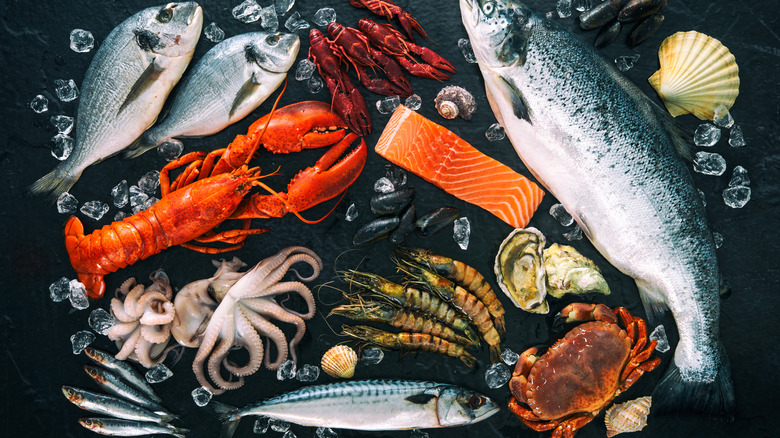The Antioxidant That Will Preserve The Collagen Layers You Already Have
While there are a plethora of creams and serums that claim to preserve our collagen layers, only a few actually work. Harvard's T.H. Chan School of Public Health explains that collagen cannot penetrate the skin when applied topically. The fibers that make up this protein are too large to go through the epidermis and reach the deepest layers of your skin. Oral collagen supplements seem to be more effective, but the research is mixed. There are also only so many things that collagen can and can't do for you.
Collagen, a natural protein, is an integral component of the skin, tendons, and other connective tissues. Its levels decrease with age, leading to the formation of wrinkles and fine lines. Certain lifestyle habits, such as smoking, drinking, and sleep deprivation, can speed up this process and damage existing collagen, per Harvard's T.H. Chan School of Public Health. What's more, your body's ability to replenish collagen declines by 1 to 1.5 percent per year as time goes by, per a 2021 review published in Plastic and Aesthetic Research.
One way to preserve your collagen layers is to avoid prolonged sun exposure and other factors that increase oxidative stress. Free radicals, or reactive oxygen species, accelerate skin aging and may contribute to DNA damage, skin cancer, and dryness, per Plastic and Aesthetic Research. On the positive side, there are steps you can take to fight oxidative stress and reduce its impact on collagen production. For example, certain antioxidants are particularly effective at maintaining collagen levels as you age.
This antioxidant preserves collagen and slows aging
Have you ever heard of astaxanthin? As it turns out, this antioxidant might hold the key to youthful, glowing skin. Astaxanthin is a carotenoid with anti-inflammatory, photoprotective, and free radical scavenging effects, per a 2018 review published in Nutrients. It occurs naturally in certain bacteria, algae, and yeasts, but it can also be synthesized in labs. Researchers found that astaxanthin can reduce oxidative stress, which in turn may delay skin aging, boost immune function, and speed up wound healing. Moreover, this compound protects against premature aging and strengthens the skin barrier.
In clinical trials, men and women who used topical astaxanthin experienced improvements in skin texture, elasticity, and overall appearance, per the 2018 review in Nutrients. This naturally occurring compound may also lock in moisture and reduce wrinkles, leading to younger-looking skin. At the same time, it decreases excess sebum production and boosts collagen levels. As the scientists note, both topical and oral astaxanthin supplements appear to be effective.
This carotenoid may also protect your collagen layers against the harmful effects of ultraviolet radiation, according to 2014 research published in Marine Drugs. On top of that, it may help prevent skin cancer due to its antioxidant and anti-inflammatory effects. Perhaps unsurprisingly, astaxanthin has greater antioxidant power than beta-carotene, ascorbic acid, or vitamin C, per a 2007 study featured in Carotenoid Science.
What are the best sources of astaxanthin?
Astaxanthin isn't as widely available as other antioxidants, but you can still incorporate it into your diet. A good source is sockeye salmon, which provides about 40 milligrams of astaxanthin per kilogram of flesh, according to a 2014 review featured in the journal Marine Drugs. Coho salmon, Atlantic salmon, pink salmon, and rainbow trout contain this antioxidant, too. Other food sources of astaxanthin include Antarctic krill, deep-sea shrimp, red yeast, and crab shells, but these aren't things you can find in most stores. Instead, look for dietary supplements containing these ingredients. For example, Antarctic krill oil boasts high doses of astaxanthin, flavonoids, sterols, and other antioxidants in addition to healthy fats (via Comprehensive Reviews in Food Science and Food Safety).
The Marine Drugs review explains that fish oil and other dietary oils can make it easier for your body to absorb astaxanthin. This compound is fat-soluble, and, therefore, it should be consumed along with fatty foods like salmon, avocado, tuna, nuts, or flaxseed oil. Alternatively, you can use it in supplement form or pamper your skin with astaxanthin creams and lotions. As far as dosage goes, take 4 to 8 milligrams of astaxanthin two or three times per day, per Natural Medicine Journal.
Note that oral astaxanthin may lower blood pressure, blood sugar, and serum calcium levels, so it may not be safe for everyone. There's also a risk of drug interactions, especially when taken with blood thinners, immunosuppressants, painkillers, anti-inflammatory drugs, and hypoglycemic agents. Ultimately, this is just one thing women should know about free radical damage — and how to fix it.


